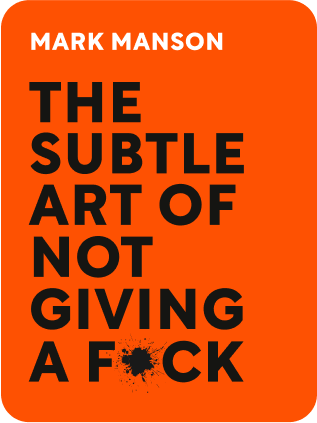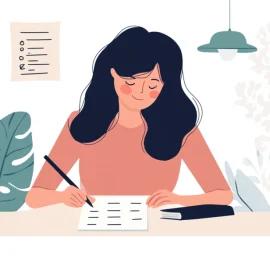

This article is an excerpt from the Shortform book guide to "The Subtle Art of Not Giving a F*ck" by Mark Manson. Shortform has the world's best summaries and analyses of books you should be reading.
Like this article? Sign up for a free trial here .
Why does accepting responsibility make you happier? Well, if somebody forced you to run 25 miles, would you be upset about it? What if you decided to run 25 miles for a marathon, would you feel accomplished?
Accepting responsibility makes all the difference when it comes to being happy. You can’t always control what happens to you, but you can control how you respond.
Continue reading to learn how powerful accepting responsibility can be.
Accepting Responsibility
When you don’t feel in control of a situation you become unhappy. You might not feel like you have any choice in the matter, or you might feel incapable of solving your problem.
It’s often a matter of perspective. A problem can make you miserable, or it can give you a sense of accomplishment when you solve it. Often the difference is in the degree to which you are responsible or feel you have a choice.
For example, if someone forced you to run 26 miles, it would be painful and you would feel miserable. But if you planned and trained for running a marathon, you’d feel pain but also a sense of accomplishment and satisfaction in completing it.
We feel in control and empowered when we accept responsibility for our problems or challenges. When forced to deal with problems not of our making we feel helpless and victimized. But here’s the solution — no matter what situation you’re in, no matter your circumstances, you always have a choice. You can choose how you feel about something, and you can choose how to behave in every situation.
We’ll discuss multiple applications of this idea below.
Once you accept your responsibility and ability to make choices, you’ll feel empowered in any situation, and this will make you happier.
You’re Always Making Choices
We don’t always control what happens to us, but we’re responsible for how we respond to it.
William James, the brother of author Henry James, came to this realization in his own life, and further developed it when he became a leading thinker in American psychology.
He had many health issues as a child and young adult, and fell short of his wealthy family’s expectations for success. He was depressed and struggled in early adulthood to find something meaningful. After dropping out of Harvard Medical School and spending time studying philosophy, he decided to spend a year accepting responsibility for everything that happened to him, good or bad.
If nothing improved within a year, it would mean he was truly powerless and he would commit suicide. As he assumed responsibility for changing his circumstances he began feeling empowered and his life began improving. He later referred to the experience as a rebirth. He became a psychologist, taught at Harvard, and lectured in the U.S. and Europe.
The path to growth begins with realizing we’re responsible for everything that happens to us, regardless of whether we caused it.
In any situation, you have more choices than you think:
- You choose the values and standards you live by and use to interpret what happens to you.
- You choose how to interpret what happens and how to respond.
You actually can’t avoid responsibility, even if you try. Even choosing not to respond is a response.
You’re always making choices. The question is, what are you choosing to give a f*ck about? What values are the basis of your choices? What standards do you use to measure yourself?
Responsibility Versus Fault
The more responsibility we assume for what happens in our lives, the more power and control we have. Responsibility is the first step toward solving our problems.
For example, a man who had trouble getting dates decided it was because he was short. He blamed women for being shallow and he felt lonely and helpless to change things. His problem was that he chose a poor value (height), and didn’t take any responsibility for solving his loneliness problem. He could have chosen a different value, for instance dating women who accepted him for who he was — thus taking responsibility for solving his problem.
We often believe that taking responsibility for something equates to be being at fault or to blame for it. But responsibility and fault are different things.
The short man looking for dates wasn’t at fault for being short (he didn’t choose the circumstance and can’t easily change it), but he was responsible for how he responded (he could choose to respond in ways that made him either miserable or happy).
We aren’t to blame for everything that happens to us (for instance, a traumatic childhood), but we’re still responsible for how we respond today. Being responsible for experiences that aren’t our fault is part of life.
Fault exists in the past, responsibility in the present. The fault for what happened lies with the choices made in the past. You’re responsible for the choices you’re currently making in response to something.
You alone are responsible for your circumstances. Others may have contributed to the situation, but you’re responsible for your unhappiness — because you are choosing how to react to and frame the situation.
For example, suppose your girlfriend leaves you for someone else. She’s at fault for the precipitating event, but not responsible for how you feel about it. Only you can make yourself happy again. You can decide to take care of yourself (a value) and learn a lesson.
It’s easy to take responsibility for positive things in our lives. But it’s more important to take responsibility for problems so we learn from them.

———End of Preview———
Like what you just read? Read the rest of the world's best book summary and analysis of Mark Manson's "The Subtle Art of Not Giving a F*ck" at Shortform .
Here's what you'll find in our full The Subtle Art of Not Giving a F*ck summary :
- How to clarify what's important to you (and not just what you think should be important)
- Why it's okay for things to not always go well in life
- Why you need to care about fewer things






